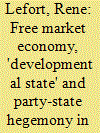| Srl | Item |
| 1 |
ID:
120912


|
|
|
|
|
| Publication |
2012.
|
| Summary/Abstract |
Ethiopia's development strategy rests on the promotion of a market economy, driven by 'new entrepreneurs', both urban and rural, while, to bring it to 'maturity' and to compensate for its present 'failures', the resolute intervention of a 'developmental state' is essential. Simultaneously, the ruling party aims to sustain its political hegemony by enrolling massively among those at the top of the social pyramid, to which most of these 'new entrepreneurs' belong, so as to build its new constituency on them. In the rural areas (83% of the population), the merger of these two objectives leads to the mobilisation of the upper group of smallholder farmers, recruited both as 'model farmers' to become the engine for the growth, notably with the support of a massive public Agricultural Extension Programme, and also as members of the ruling party. However, the subordination of the regime's economic objectives to its political agenda undermines the implementation of its development strategy at the field level. This raises questions about the efficiency of the programme and the room left for entrepreneurship, even though this is a mainstay of the market economy that the regime sees as 'vital' for Ethiopia's 'survival' (Meles 2006).
|
|
|
|
|
|
|
|
|
|
|
|
|
|
|
|
| 2 |
ID:
155761


|
|
|
|
|
| Summary/Abstract |
Since the early 2000s, the discourse of “economic territory” has surfaced in conjunction with economic neoliberalization in South Korea. This paper argues that economic territory as a geoeconomic imaginary not only facilitated the expansion of free trade agreements as an accumulation strategy but also served as a hegemonic project which masked the nature of an accumulation strategy as a class project and consolidated political legitimacy by manipulating nationalism. To examine this linkage, it critically draws upon the idea of cultural political economy (CPE) developed by Lancaster-based sociologists Bob Jessop and Ngai-Ling Sum. This paper offers a fresh and more substantial interpretation of South Korea’s political economy and opens up new analytical space for CPE.
|
|
|
|
|
|
|
|
|
|
|
|
|
|
|
|
| 3 |
ID:
168725


|
|
|